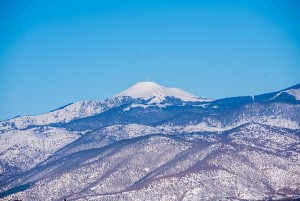Experts have noted parallels between the way you can use this weather for either side of the climate argument and the way rising crime militates either for or against increased policing.
 Mevasseret Tzion, February 9 – The lowest sustained temperatures Israel has seen in decades – more than two weeks with the thermometer moving into double-digit-centigrade territory perhaps once in the hills around Jerusalem – either put the kibosh on the case that anthropogenic change has appreciably altered weather patterns through raised temperatures, or bolstered its argument that such an increase leads to greater extremes in weather, and therefore demonstrates the dire need to act toward curtailment of industrial emissions and the like, depending on which camp you have chosen to follow.
Mevasseret Tzion, February 9 – The lowest sustained temperatures Israel has seen in decades – more than two weeks with the thermometer moving into double-digit-centigrade territory perhaps once in the hills around Jerusalem – either put the kibosh on the case that anthropogenic change has appreciably altered weather patterns through raised temperatures, or bolstered its argument that such an increase leads to greater extremes in weather, and therefore demonstrates the dire need to act toward curtailment of industrial emissions and the like, depending on which camp you have chosen to follow.
The second half of January 2022 marked the first time in local memory that such a span elapsed in this part of the country without a peak daytime temperature of 10ºC (50ºF) or above. Israel’s climate normally features several dips into single-digits during the most intense part of winter, especially in inland mountainous areas, but seldom for such an extended period at once. Partisans in the debate over climate change have seized on the occurrence as confirming their side of the controversy: if you think temperatures are in fact rising overall, the instance of unusually cold weather validates predictions that more heat in the atmosphere translates into more extreme weather; if you think temperatures fluctuate naturally regardless of human-driven output, the sustained cold weather undermines the premise that temperatures are on the increase.
“This unprecedented cold snap accentuates the climate crisis,” you will argue, if your sensibilities align with mainstream global environmentalist rhetoric. “The flora and fauna of this area are not accustomed to such vagaries or extremes, and that threatens the ecosystems. As a society, we must cut our carbon emissions, and while that requires scaling back certain luxuries or paying more for things, Earth all but demands it.”
On the other hand, if you reject the notion that such policies will benefit humanity or the environment, or are necessary in the first place, you employ the recent cold streak accordingly. “This weather demolishes the whole anthropogenic climate change thesis,” you will claim. “They move the goalposts all the time, and their apocalyptic models never get anywhere near what happens in reality. And it’s the poor who bear the brunt of the burden and suffering they want to inflict on us. It’s as cold as it needs to be. Now let everyone live their lives as they please and if you want to hug a tree or pick some plastic out of the ocean, go right ahead. It’s not what little Israel does that matters, but what China and India do, and they aren’t listening to tree-huggers.”
Experts have noted parallels between the way you can use this weather for either side of the climate argument and the way rising crime militates either for or against increased policing.
Please support our work through Patreon.




